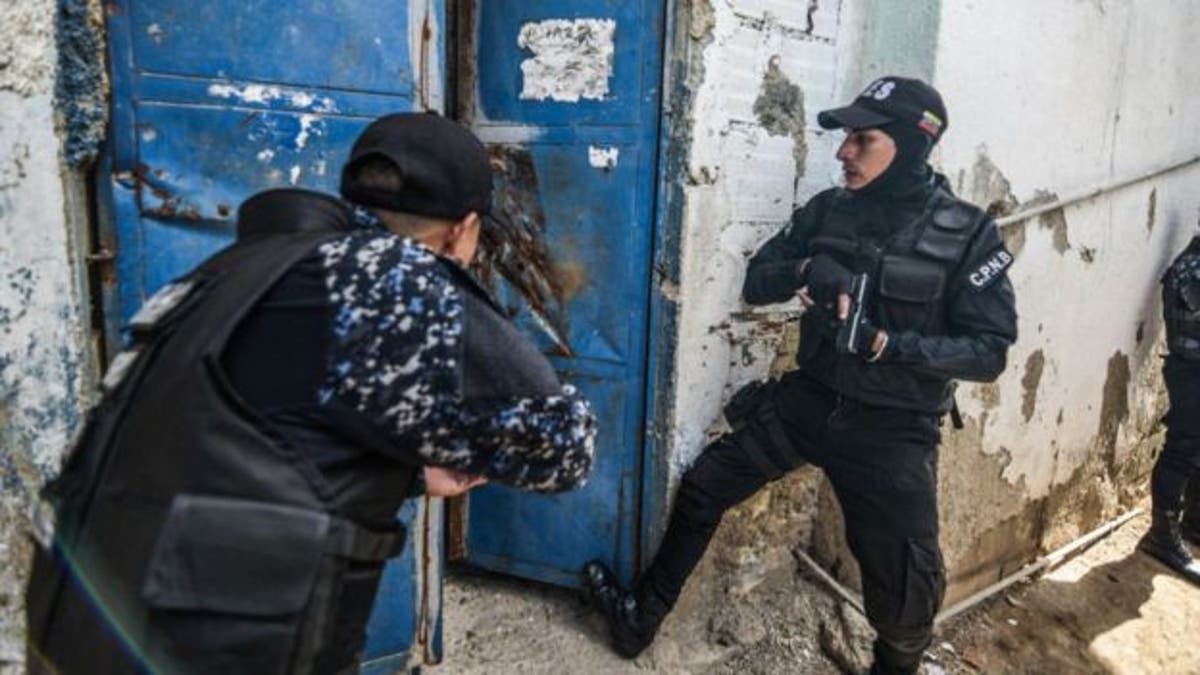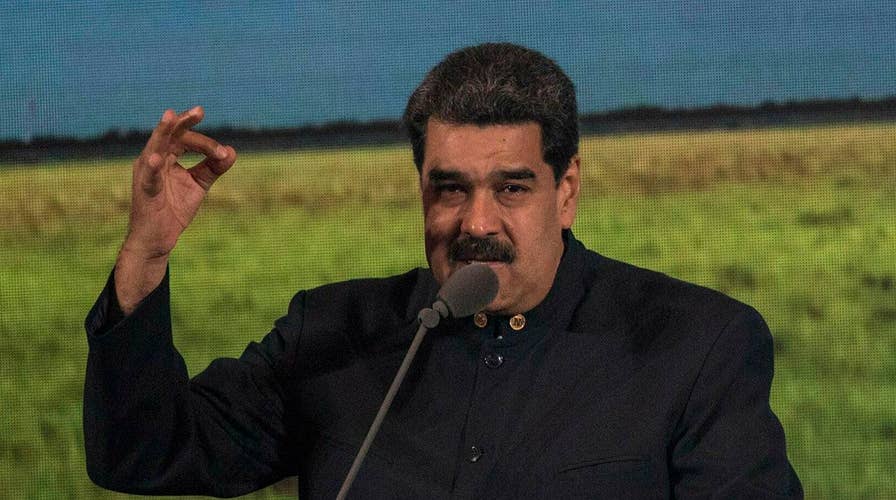In what Venezuela experts call a sign of President Nicolas Maduro's desperate attempts to cling to power, special National Police squads dressed in black masks and uniforms this year apparently began targeting protesters.
Since January, more than 40 deaths – many of which occurred during the mass protests against Maduro - have been linked to the special police force, which uses military weapons and is known as the “Death Squad.”
They also are known as the FAES —the Spanish acronym for the Bolivarian National Police’s Special Action Forces.
Marino Alvarado, investigations coordinator for PROVEA, one of Venezuela’s leading human rights organizations, says that the squad initially was established about two years ago to be an elite unit with military training that would respond to “extraordinary” situations such as hostage-taking, or a mass public safety threat that police with routine training were ill-equipped to handle.
But last year, Alvarado said, the squads targeted people in situations that hardly were extraordinary. They started pursuing and killing people linked to petty crimes. Alvarado said the squads killed 205 people.
“Every time they got involved, it ended in a fatality,” Alvarado said to Fox News. “They massacred about four or so people every week.”
“Here was a military-level elite unit theoretically created to save lives, but the reality is that they extinguish lives,” Alvarado said. “Their mission now is to take up arms against the Venezuelan people, against those who express dissent.”
On Friday, the Trump administration announced new sanctions through the U.S. Department of the Treasury’s Office of Foreign Assets Control (OFAC) against five Venezuelan government officials, including FAES director Rafael Enrique Bastardo Mendoza.
“Treasury continues to target officials who have helped the illegitimate Maduro regime repress the Venezuelan people. We are sanctioning officials in charge of Maduro’s security and intelligence apparatus, which has systematically violated human rights and suppressed democracy, including through torture and other brutal use of force,” said Treasury Secretary Steven Mnuchin in a written statement. “We are intent on going after those facilitating Maduro’s corruption and predation, including by sanctioning the President of PdVSA (state-owned oil company) and others diverting assets that rightfully belong to the people of Venezuela.”
"As a result of today’s action, all property and interests in property of these individuals, and of any entities that are owned, directly or indirectly, 50 percent or more by such individuals, that are in the United States or in the possession or control of U.S. persons are blocked and must be reported to OFAC. OFAC’s regulations generally prohibit all dealings by U.S. persons or within (or transiting) the United States that involve any property or interests in property of blocked or designated persons."
The agency's press release about the sanctions said: "FAES has been branded as Maduro’s 'extermination squad,' known for its brutal methods and masked appearances, carrying out nighttime raids throughout Caracas."
Efforts by Fox News to get a response from the Venezuelan Ministry of Information in Caracas were unsuccessful. A Maduro ally, Diosdado Cabello, who is head of Venezuela’s Socialist Party, has said accusations of FAES acting as a death squad are manufactured lies disseminated by political opponents, according to Reuters.

A few weeks ago, FAES pushed back against the accusations on social media, saying: “Our struggle is against all criminals that ravage our communities. If you fear the FAES it’s because you’re a criminal.”
While lawmaker Juan Guaido's recognition by dozens of countries as Venezuela's rightful president has renewed the opposition's hope of gaining power after two decades of a socialist rule, it also has riled up Maduro's still sizable pro-government base.
Pictures and videos posted on social media show the squad acting aggressively against protesters and also show members near apparently lifeless bodies.
The Caracas Chronicles, an independent news outlet founded in 2002, has run blistering essays and stories about FAES.
“They break into your room and drag you from your house,” the newspaper reported in late January. “If you resist, they murder you in your own living room. They don’t care that your family’s right there watching, they don’t care that the neighbors can hear when they beat you senseless with steel tubes filled with cement.”
“Silent and deadly, the FAES are police Death Squads in all but name.”
In an editorial published Thursday in the Washington Post, Francisco Toro, the Chronicles founder, assailed the U.S. House Foreign Affairs Committee for holding a hearing on the socio-political crisis in Venezuela that did not devote enough attention to human rights abuses in the South American nation.
“The spread of death-squad tactics has been one of the most stomach-churning aspects of this year’s political crisis,” Toro wrote, “with mass fear spreading through poorer areas and just a handful of victims daring to come forward and tell their stories on the record.”
Toro targeted Rep. Ilhan Omar, a Minnesota Democrat, for ignoring the killings of protesters in Venezuela during her questioning of the Trump administration’s envoy to Venezuela, Elliott Abrams, during the hearing.
He expressed outrage over learning that “rather than standing up to Maduro’s death squads, Rep. Ilhan Omar had used an exchange with the Trump administration’s envoy to pressure the United States to do nothing at all to rein them in.”
“In a grotesque display of contempt for the Venezuelan mothers grieving for their children, the Maduro regime has murdered in recent weeks, Omar chose to use her stage to attack the U.S. envoy, Elliott Abrams, for decades-old abuses in Central America.”
Despite having the world's largest oil reserves, Venezuela is suffering soaring levels of malnutrition, disease and violence after 20 years of socialist rule launched by the late President Hugo Chavez. Critics accuse Maduro, a former bus driver and Chavez's hand-picked successor, of unfairly winning an election last year for a second six-year term by banning his popular rivals from running and jailing others. PROVEA says that currently Venezuela has just under 1,000 political prisoners -- more than at any other time in its history.
Opposition leader Juan Guaido, who claims to have assumed presidential power as head of the opposition-led National Assembly last month, has worked to push aid through Venezuela’s borders in an attempt to further pressure Maduro’s regime and restore democracy in the country. The 35-year-old lawmaker has received overwhelming backing from roughly 40 countries led by the United States.
The Treasury Department press release about the sanctions against the FAES director said: "Since Guaidó assumed his position as Interim President, FAES has been accused of dozens of extrajudicial killings targeting the opposition. On January 31, 2019, in the middle of Guaidó’s news conference on his economic plans, Guaidó said that FAES were in his home threatening his family."
CLICK HERE TO GET THE FOX NEWS APP
Experts on Venezuela say that FAES’s brutality in the poorest neighborhoods, where Chavez enjoyed some of the strongest support, shows how threatened Maduro feels.
“FAES is effectively one the main pillars of the Maduro regime,” said Guillermo Zubillaga, head of the Venezuela Working Group for Americas Society/Council of the Americas. “It’s one of the few remaining security forces in Venezuela willing to follow the orders they receive from Maduro. Other security forces are not following orders, knowing the rejection of Maduro by many Venezuelans. But the rule of law does not apply to FAES, they act with impunity.”
“If there’s still any doubt about whether the Maduro regime is a dictatorship, FAES should prove that it is.”
The Associated Press contributed to this report.

